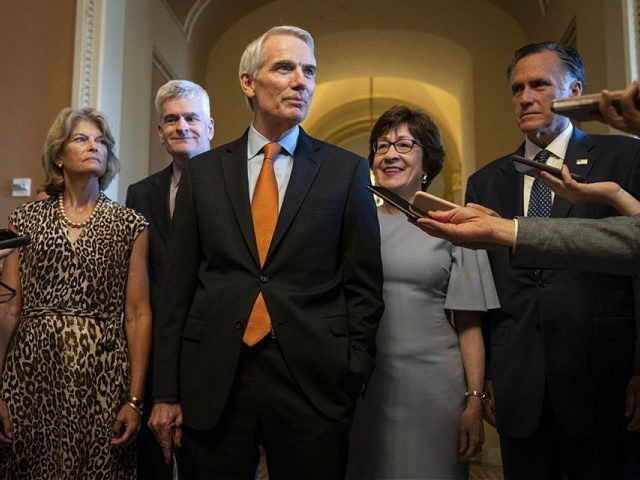Eighteen Senate Republicans voted Sunday to clear the final hurdle before a floor vote to advance the so-called “bipartisan” infrastructure bill.
The Senate 68-29 voted to invoke cloture on the bipartisan infrastructure bill, otherwise known as the Infrastructure Investment and Jobs Act.
The vote means the Senate could take up the bill perhaps by early Tuesday morning, meaning they could pass the mammoth, 2,702-page, $1.2 trillion legislation in the dead of night.
Eighteen Senate Republicans voted to advance the bill Sunday, potentially clearing the significant hurdle of passing the bill through the Senate.
The 18 Senate Republicans who voted to advance the so-called infrastructure reportedly include:
- Roy Blunt (R-MO)
- Richard Burr (R-NC)
- Bill Cassidy (R-LA)
- Shelley Moore Capito (R-WV)
- Susan Collins (R-ME)
- Kevin Cramer (R-ND)
- John Hoeven (R-ND)
- Mitch McConnell (R-KY)
- Lisa Murkowski (R-AK)
- Rob Portman (R-OH)
- Jim Risch (R-ID)
- Mitt Romney (R-UT)
- Thom Tillis (R-NC)
- Deb Fischer (R-NE)
- John Cornyn (R-TX)
- Roger Wicker (R-MS)
- Dan Sullivan (R-AK)
- Mike Crapo (R-ID)
Wicker, who previously voted against advancing the legislation, voted in favor of invoking cloture Sunday.
“The bill we’re now debating is far from perfect. If I were the only one with a pen, I would have made many changes. But at the end of the day, I believe this package will do a great service for the United States of America and a great service to my home state of Mississippi,” Wicker said on the Senate floor Sunday.
Young, who previously voted to advance the infrastructure bill, came out against the legislation Sunday. He is up for reelection during the 2022 midterm elections. Young said in a statement Sunday:
For the last several months, I’ve been working diligently with my colleagues toward a bipartisan infrastructure bill to provide crucial funding for our crumbling roads and bridges and to make targeted investments that yield positive long-term results in areas like broadband, ports, and airports.
As I’ve said many times, while I’m eager for a bill that makes these investments, I’m also committed to doing so in a fiscally responsible way. Having reviewed the Congressional Budget Office’s (CBO) estimated fiscal impact of this legislation as currently constructed, and frankly still not being comfortable with a number of the Democratic priorities contained in this version, I will vote “no.”
Senators tried unsuccessfully to add amendments to the bill, but the Senate failed to agree on how to add amendments to the bill.
Sens. Cynthia Lummis (R-WY), Ron Wyden (D-OR), and Pat Toomey (R-PA) have proposed an amendment to the infrastructure bill that would address the $30 billion tax on the cryptocurrency industry. Lawmakers and industry officials contend the bill could send American jobs overseas.
Sen. Bill Hagerty (R-TN) tried to slow down the advancement of the bill to bring up amendments to the bill, but Sen. Kyrsten Sinema (D-AZ) objected, claiming that Hagerty refused to agree to a timetable on the amendments.
Sen. Chuck Grassley (R-IA) tried to bring up his own amendment that would lessen the bill’s fiscal impact but failed:
I offered 2 bipartisan amendments to infrastructure bill 1 wld save taxpayers $100M+ of fraud via false claims act 2. Wld give states more flexibility of funds 2strengthen rural broadband Both make bill better for Iowa but Dems blocked by denying me my unanimous consent request
— ChuckGrassley (@ChuckGrassley) August 8, 2021
“We have wasted all day Thursday, Saturday and now through Sunday,” Grassley said. “That’s enough time to vote on a multitude of amendments, and we just sat around those three days, accomplishing nothing.”
Sean Moran is a congressional reporter for Breitbart News. Follow him on Twitter @SeanMoran3.

COMMENTS
Please let us know if you're having issues with commenting.